newsletter
highly curated, every sunday.
Issue 47: How to Find Your Muse in Museums
A museum doesn't have to be a mausoleum
Dear Reader,
Food For Thought
Every time I go to a museum, I try to sign up for a tour or, at the very least, obtain an audio guide from the front desk. Much like an ayahuasca trip requiring a shaman, a guide is a critical element to a successful day trip to any museum – perhaps the critical element. This is because engaging fully with a museum is a unique challenge that we don't often face in the domain of the "real world". In a museum you are dealing with multiple dimensions of constraints – constraints that often conflict with one another.
These constraints include:
- Whitespace of the walls and windows, intentionally placed by the curators, creating a crowded or empty atmosphere that you are dropped into at random (design)
- Multiple pieces in your eye line will call out to your sensibilities, drawing you in to spend your limited time with them over their peers. This is then compounded by the galleries within the museum competing with one another (marketing)
- Thick panes of glass and stilted breaths of fellow museum-goers, creating an air of consistent fragility and caution throughout the building (discomfort)
- Art from the dead does not talk, without being lent a voice (mortality)
- Competition with fellow museum-goers to appreciate deeply without pausing, to talk while remaining silent, to walk languidly while moving briskly (rivalry)
- Being stripped from five usable senses: smell, sight, hearing, touch, taste in the real world – to just one: sight (limitation)
Without a guide, the museum is a frenetic draw from color to color, from crowd to crowd, from fleeting desire to new flame – all while in the background we compete with ourselves and one another to understand the culture, to engage while remaining passive.
The feeling of wandering aimlessly through a museum is similar to the pull of a library bookshelf, as described by Vilém Flusser:
...the wall of the library is different and functions differently. The spines of the books, lined up beside one another and over one another, form a secondary wall, positioned in front of the actual wall. Between the spines of the books and the actual wall is a zone of paper, where, in consideration of the reflections just undertaken here, numerous arms are trying to take hold of us. They can only do this if we ourselves stretch out an arm in their direction, pull a spine out from the wall, and turn the book around, to allow ourselves to be taken in by it.
-- Does Writing Have a Future? (Electronic Mediations Book 33) (affiliate link)
A guide changes this dynamic.
A guide forces you to slow down, to consider the piece in front of you as not just a visual spectacle to try to grapple with, but as a historical moment, actively leading you to new questions and associations that you may not have even known you had.
By simply adding context to the pieces that occupy the walls, the problems of design, mortality, and limitation fade away instantly. Museum curators and historical archivists are artists too, after all, and artists love to talk about their work (or at least, to justify their choices). Guides give them that chance.
As for discomfort and rivalry, by deepening your relationship with the museum itself, you'll begin to see that the museum is not, in fact, a mausoleum, but a garden of human artistry. This will make each trip become less about conforming to the flow of others, and more about following a solitudinous pace where you get to learn the most you possibly can, to take the most of the art you can home with you, in your memories. Engaging with time in space, this is what a museum does for its patrons.
the museum is not, in fact, a mausoleum, but a garden of human artistry
Learning to museum correctly is a valuable skill, since each city across the world will have its own art and history to explore. If you wish to truly be a global native as you travel, make it a priority to visit a city's museum.
And grab a guide, if you can.
What if the real world had the intention of museums? What if there was a museum you could touch? What if we could rediscover the beauty and historical significance of the places we move through every day? That we live in every day?
But...we don't live in a museum. Right? Next week, we will tackle the idea of how the real world can be a museum...if we bring a guide.
 ChatGPT
ChatGPT
Ye Olde Newsstand - Weekly Updates
 Bram AdamsBram Adams
Bram AdamsBram Adams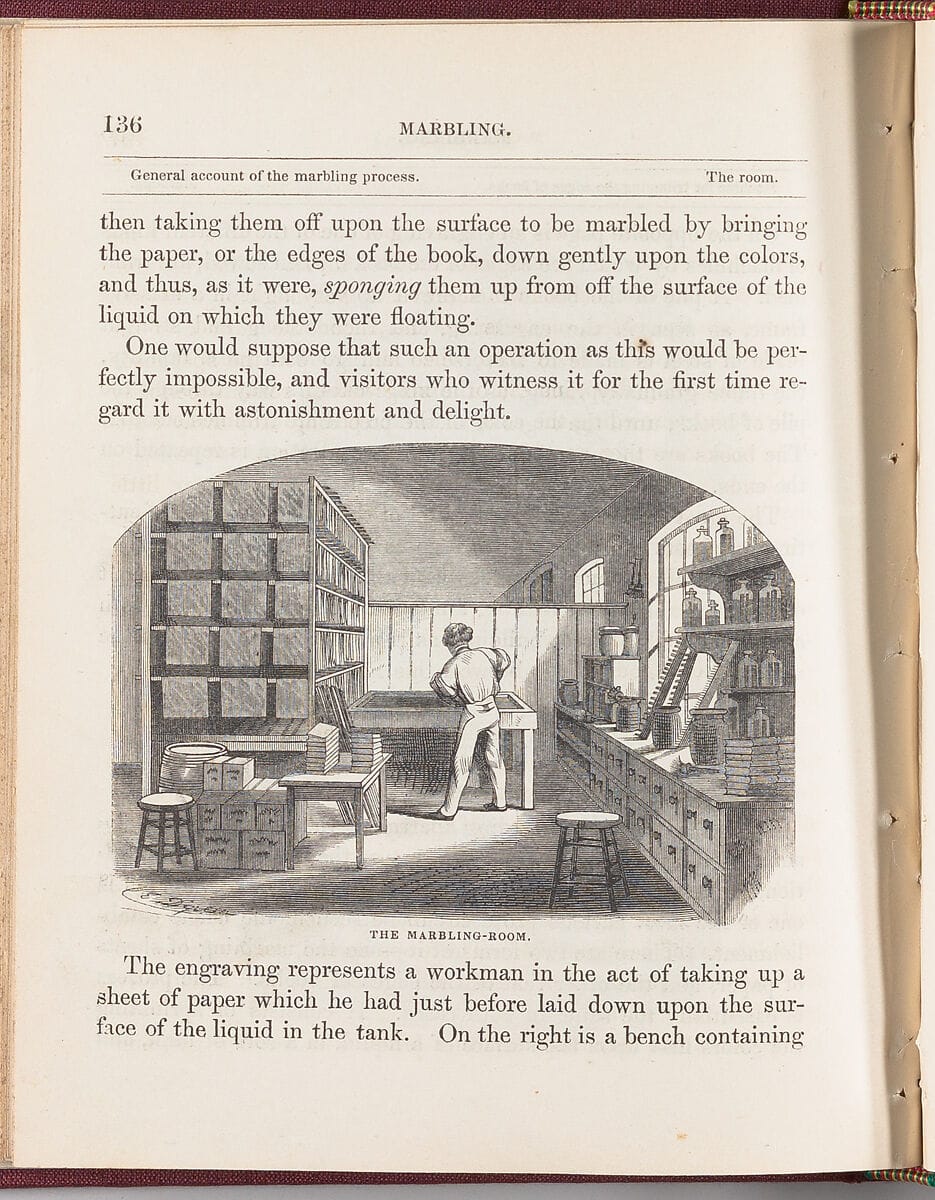
I've finally gotten around to writing/recording book reviews for some of the books I finished so far this year.
 Bram AdamsBram Adams
Bram AdamsBram Adams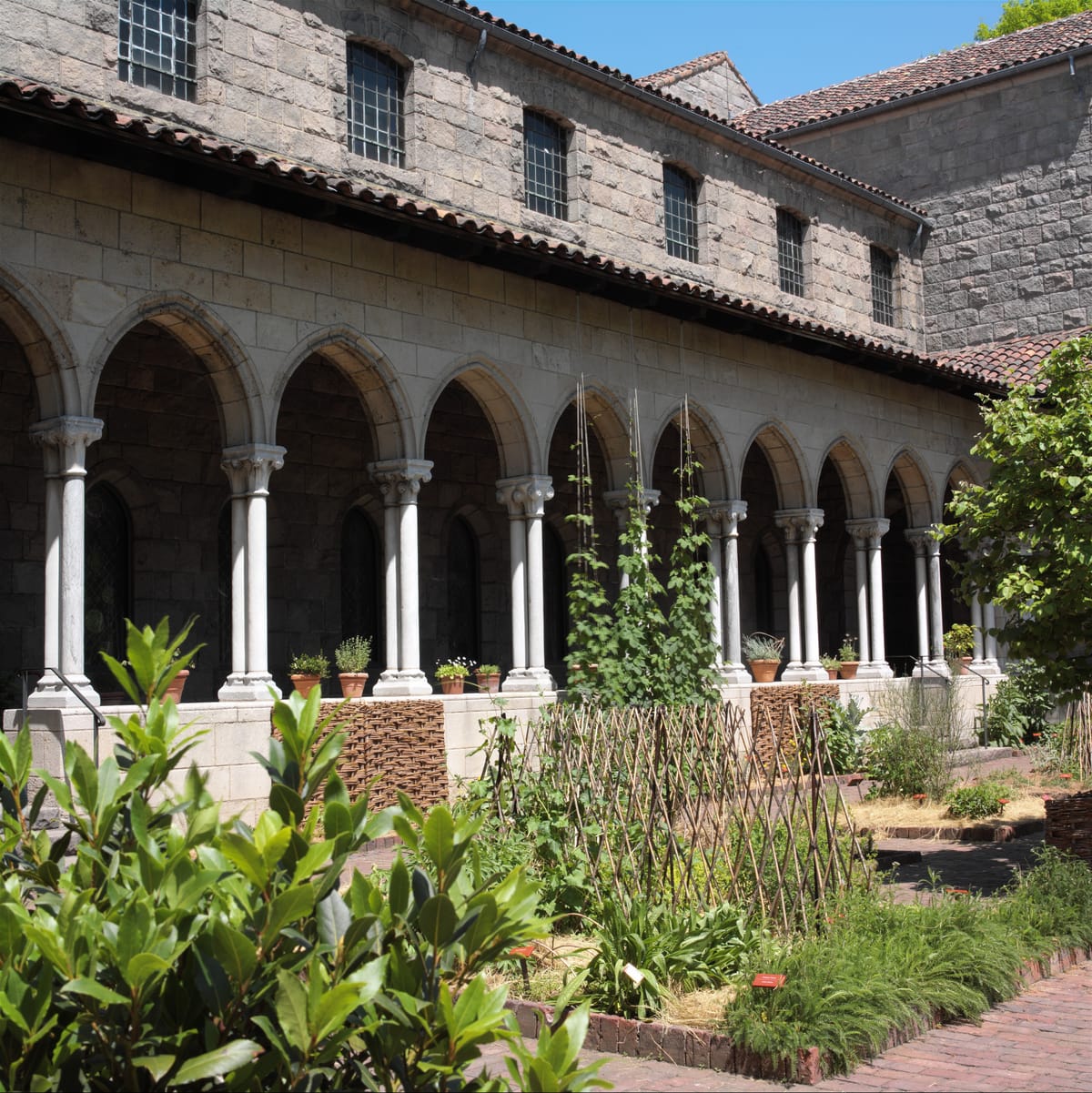
The media dump includes some banger songs this week.
 Bram AdamsBram Adams
Bram AdamsBram Adams
I look forward to a world where ChatGPT can have full embedded links in chats. Tiny little web browsers. For now, this will have to do.
On My Nightstand - What I'm Reading
Artists who never break through, the data tells us, tend to present their work to the same few places over and over again. The artists who make it big, in contrast, present to a far wider set of places, allowing themselves to stumble upon a big break.
-- Don't Trust Your Gut: Using Data to Get What You Really Want in LIfe (affiliate link)
For artists starting at the periphery, success was largely local and painfully incremental. Why did our predictions work so well? Precisely because performance in art can’t be measured. Since there is no way of establishing that any work of art is truly better than another, the network takes over, establishing value. In a way, that aptly reflects our premise in chapter 1: Success depends not on you or your performance but on us. The network is what carries the collective response to your performance.
-- The Formula: The Universal Laws of Success (affiliate link)
Art is high-quality endeavor. That is all that really needs to be said. Or, if something more high-sounding is demanded: Art is the Godhead as revealed in the works of man.
-- Zen and the Art of Motorcycle Maintenance: An Inquiry Into Values (affiliate link)
“Aesthetic genius,” Wit said, “invention, acumen, creativity. Noble ideals indeed. Most men would pick one of those, if given the choice, and name them the greatest of talents.” He plucked a string. “What beautiful liars we are.” The guards glanced at each other; the torches burning in brackets on the wall painted them with orange light. “You think I’m a cynic,” Wit said. “You think I’m going to tell you that men claim to value these ideals, but secretly prefer base talents. The ability to gather coin or to charm women. Well, I am a cynic, but in this case, I actually think those scholars were honest. Their answers speak for the souls of men. In our hearts, we want to believe in—and would choose—great accomplishment and virtue. That’s why our lies, particularly to ourselves, are so beautiful.”
-- The Way of Kings (The Stormlight Archive, Book 1) (affiliate link)
i did not train you to be a demon or a human. i showed you how to be an artist. to be an artist is to do one thing only...look at me... cannot fight, or weave, or farm. i make swords. i cook for strength to make good swords. i study the sutras to cleanse my heart to make good swords.
you think revenge is an art?
swords, pots, noodles, death. it is all the same to an artist.
then i am a bad artist.
an artist gives all they have to the art, the whole. your strengths and deficiencies, your loves and shames. perhaps the people you collected...i made my best blades when i had an apprentice.
i thought i annoyed you.
both are true. there may be a demon inside you, but there is more. if you do not invite the whole, the demon takes two chairs, and your art will suffer.
then what do i do?
i only know how to make swords. each morning, i start a fire. and begin again.
-- swordfather + mizu, blue eye samuri, episode 7
Thanks for reading, and see you next Sunday!
ars longa, vita brevis,
Bram
Issue 46: Is Being Well Read Actually a Thing? Pt III: The Well-Read Archetypes
On being well read within, without, by mastery
- Part One: Zero to One
- Part Two: The Upper Class of Readers
- Part Three: The Well-Read Archetypes (you are here)
Dear Reader,
Food For Thought
Welcome to the final part of the well-read series! Let's quickly review where we've been so far and what we'll be looking at in the final issue of the series.
In the first part of the series, we took a look at statistics collected from the Washington Post about the reading habits of Americans in 2023 – the critical takeaway was that the median American (50th percentile) read less than two books in 2023. We discussed why this is a frog-boiling problem, and why fear of boredom may be the case that Americans read so little. I then suggested a zero to one strategy that could be used to bring the average reader to reading one book a month, or twelve books in a year, or ten more books than are currently being read.
In the second part of the series, we discussed an uniquely interesting insight from the above dataset – that readers seemed to subconsciously congeal into three "classes" of readers, quite similar to the stratifications of upper, middle, and lower classes in society. Then I introduced the concepts of book inertia and book density, how to move up to the reader class chain with consistency, and how inertia can prevent burnout.
In this final issue of the well-read series, I'd like to discuss the topic of being well-read itself. Up until now, I've been evasive in defining what I believe are the necessary prerequisites to becoming a well-read individual. Even as I write this newsletter, my definition of being well-read is in a liquid, evolving state. Being well-read is an abstract place with no acute measurement tools, a godhead for readers to chase after, than to actually consistently be. Therefore, any simple definition falls flat.
Instead, I think there are (at least) three entirely defensible definitions of being a well-read person. These are:
- Well Read Within a Topic
- Well Read Without a Topic
- Well Read by Mastery
Let's go over these one by one.
Well-Read Within a Topic
To become well-read within a topic, a person sets out to consume as much as they can about a particular field or subfield of study. This person will seek to learn all available aspects of their topic of study, and does not shy away from delving uncomfortably deep into mastery over their choice.
Two signs of a well-read person within a topic:
- The ability to play devil's advocate for any argument within their topic. This is a sign that they have not only voraciously read books that affirm their cognitive biases, but they also sought out the best literature that actively disagree with their world view.
- They will be able to summon a mind map anywhere and any time about their topic. They seem to have spatial understanding of their topic and have a deep historical knowledge as to why things are, and perhaps more importantly, why other things aren't.
A focus into a singular body of study for years with deliberate practice can create a person who is well-read within a topic.
Obsession paired with notation.
Well-Read Without a Topic
To become well-read without a topic is in some ways opposite to being well-read within a topic but there are similarities. The main motivation of being well read without a topic is to chase curiosity wherever it leads you, without any form of judgement attached.
Signs of a well-read person without a topic:
- Survey knowledge of many fields. Able to reference trivia at the drop of a hat, conversationally fluent with different experts in many rooms.
- Able to transfer learnings from one field and apply them directly to another. Willing to question things with the premise that all knowledge is ever-changing and propositional.
- Can be found in multiple sections of a bookstore, creating journeyman level knowledge in multiple fields of study.
Liberal arts degrees are an example of becoming well read without a topic, taking as many opportunities available to act on curiosity. The final state of a person well-read without a topic is the archetypal Renaissance man.
Well-Read By Mastery
To be well-read by mastery is to have the ability to not shy away from any difficult book, to have a firm grasp on the underlying skill of reading and remembering information that lies within a library of books.
Signs of a well-read person by mastery include:
- A highly retentive memory and usage of spaced repetition techniques. An ability to analyze an authors' arguments objectively and derive new insights from any book.
- The ability to grab any book off the shelf in a library and conquer it – be it classics, theoretical, old, new, etc.
A person well-read by mastery will have likely read less books than the other two categories, and is likely has the most "raw talent" of the well read archetypes.
What Am I?
If my reading practice were split from a whole into percentages of the above categories, I am roughly 65% well-read without, 25% well-read within (computer science & philosophy topic driven) and 10% well-read by mastery (there are a number of books in the English corpus I haven't tackled due to their complexity – not to mention all the great books in other languages!
Conclusion
Wow! What a series! I think we covered a lot of ground, and hopefully these issues will inspire you to pick up (or deepen) your relationship with reading in 2024.
To wrap up this series, I'll leave you with a quote from Kevin Kelly. It's simple, but it really summarizes the point of what reading is good for.
To be remarkable, read books.
-- Excellent Advice for Living: Wisdom I Wish I'd Known Earlier (affl. link)
Ye Olde Newsstand - Weekly Updates
 Bram AdamsBram Adams
Bram AdamsBram Adams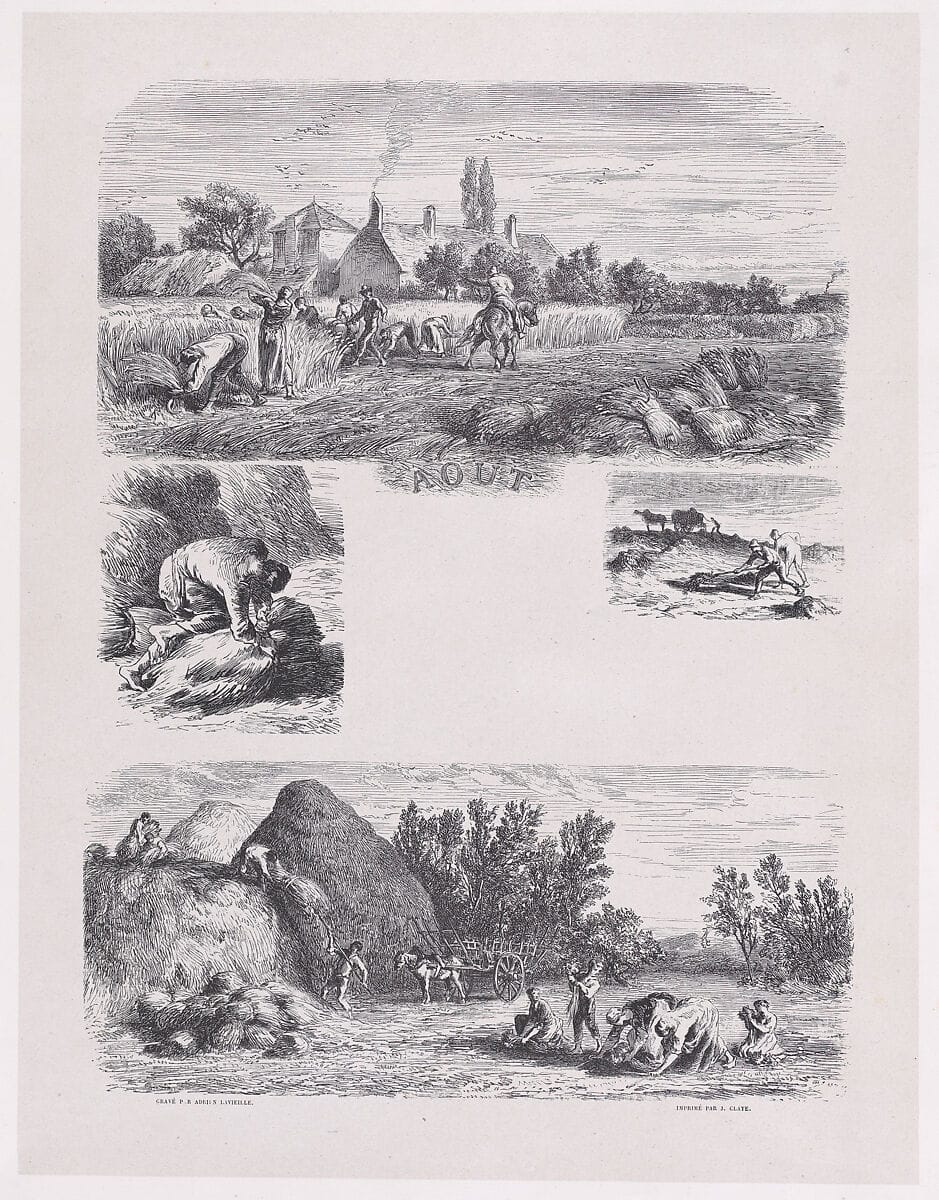
weekly media dump!
Thanks for reading, and see you next Sunday!
ars longa, vita brevis,
Bram
Issue 45: Is Being Well Read Actually A Thing? Pt II: The Upper Class of Readers
How we can achieve reader mobility through inertia, and become a master with density
- Part One: Zero to One
- Part Two: The Upper Class of Readers (you are here)
- Part Three: The Well-Read Archetypes
Dear Reader,
Food For Thought
Last week, we talked about some disheartening statistics from a recent survey done by the Washington Post about how many books the average U.S. reader completed in 2023. The results were that 50% of the population surveyed completed only 1-2 books in the calendar year of 2023. We then touched on why this might be the case, and what boredom's love-affair with modern technology (social media) might have to do with it. Finally, we discussed a potential strategy in the Secretary Problem that non-readers could use to raise the consistency of a reading habit to twelve books a year (one per month – go check it out if you want to improve your reading practice!).
This week we will be returning to the Washington Post dataset once more to point out an interesting emergent quirk that wasn't talked about – there seems to be distinct classes of readership.
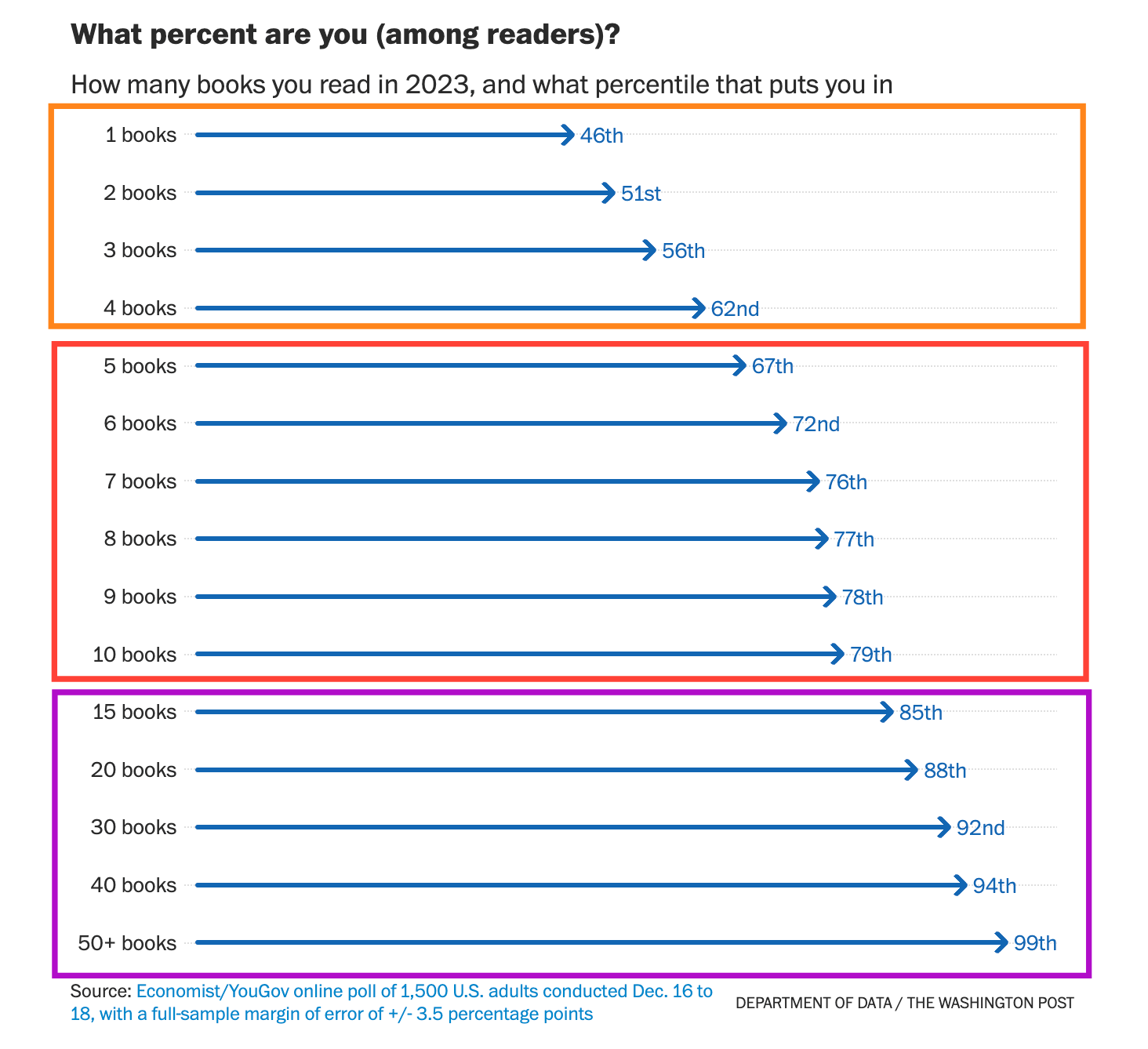
In the data above, we can see three broad categories of readers emerge from this survey: the 1-5 book readers class ("lower" class), the 5-10 book readers class ("middle" class), and the 15-50+ book readers class ("upper" class). Inside these classes, reading one or two books extra per year won't really move the needle of "moving up the food chain". In other words, the social mobility of book reading is less about book density than it is about book inertia. But what are density and inertia in these contexts?
Book density – the intensity of a reader's practice, is a low value metric – in the upper echelon/class of readers, the difference between reading 30 books a year and 60 books a year is a mere 7%. That is thirty times more books than the median American reads per year, and yet those 30 entire-ass books(!) only nets you a small edge over your peers within your reader class.
Book inertia – how consistently you read books (daily, weekly, once or twice a month) is much more important. Even the slowest reader will be middle class by the end of the year, by simply making a commitment to read every day. It is trivial to join the reader middle class if one keeps their reading habit in motion for 15-30mins a day, and does not allow it to drop.
But is there any real value to being an upper class reader anyway? Is it at all equatable to the upper class of fiat wealth? Why bother?
Well, for one, as an upper class reader you will be exposed to a variety of topics and ideas that will deepen and broaden your world view at the same time. You will be able to know that you have the ability to grapple with complex subjects from the minds of different humans, and not just any humans, but intelligent experts in a subject. Finally, you will be able to deepen your relationship to doing something "boring" and slowing down the mind to a comfortable, not-as-overwhelmed speed. These are the advantages of having both density and inertia, but density can only be gained after mastering inertia. If you attempt to put density before habit, the system will quickly overheat, causing burnout.
Some may consider the number of books read per year a poor metric. The difference of difficulty and lengths between books is highly variable. Fifty self help short reads are not directly comparable to five textbooks about quantum physics or original books on political theory. In addition, books read can be a falsified metric as people could "skim" books, "listen" to audiobooks while they sleep or of course, just straight up lie (just think about how often grown-ass men will lie about the size of thier manhood or how somehow everyone thinks they are a better driver than everyone else on the road – ego is a beast that preys on objectivity after all).
Even with these obvious status grabs and complexities weighing down the metric of the value of "books read" – I think it is still noble to pursue the aim of being in the "upper class" of reading, even if we all miss the mark and get more people lying (but trying) to complete books. By reclaiming our ability to struggle with books on a consistent basis, we will become a society that truly reads. We will reclaim inertia. Or:
A reader in motion, stays in motion.
Last issue, I lambasted technology for increasing the temperature of freneticism in daily life. This is very much the case, but technology is not all bad. I am a major proponent of e-books, because they make reading so much more accessible everywhere – syncing between phone, laptop, and Kindle while being able to read 5+ books in parallel all while fitting in your pocket is something that simply cannot be done with the physical-paper form of books (Kindle is the closest real world analogy we have to Capsule Corp from Dragon Ball). In addition, e-readers allow for font changes, and can adjust to readers speeds if your eyes tire from the practice. Most importantly, e-reading allows for connections to be made through highlighting and storing agains services like Readwise or Goodreads. These highlights can then be digitized and embedded in systems like Commonplace Bot, or can be turned into a visual graph to see connections between ideas.
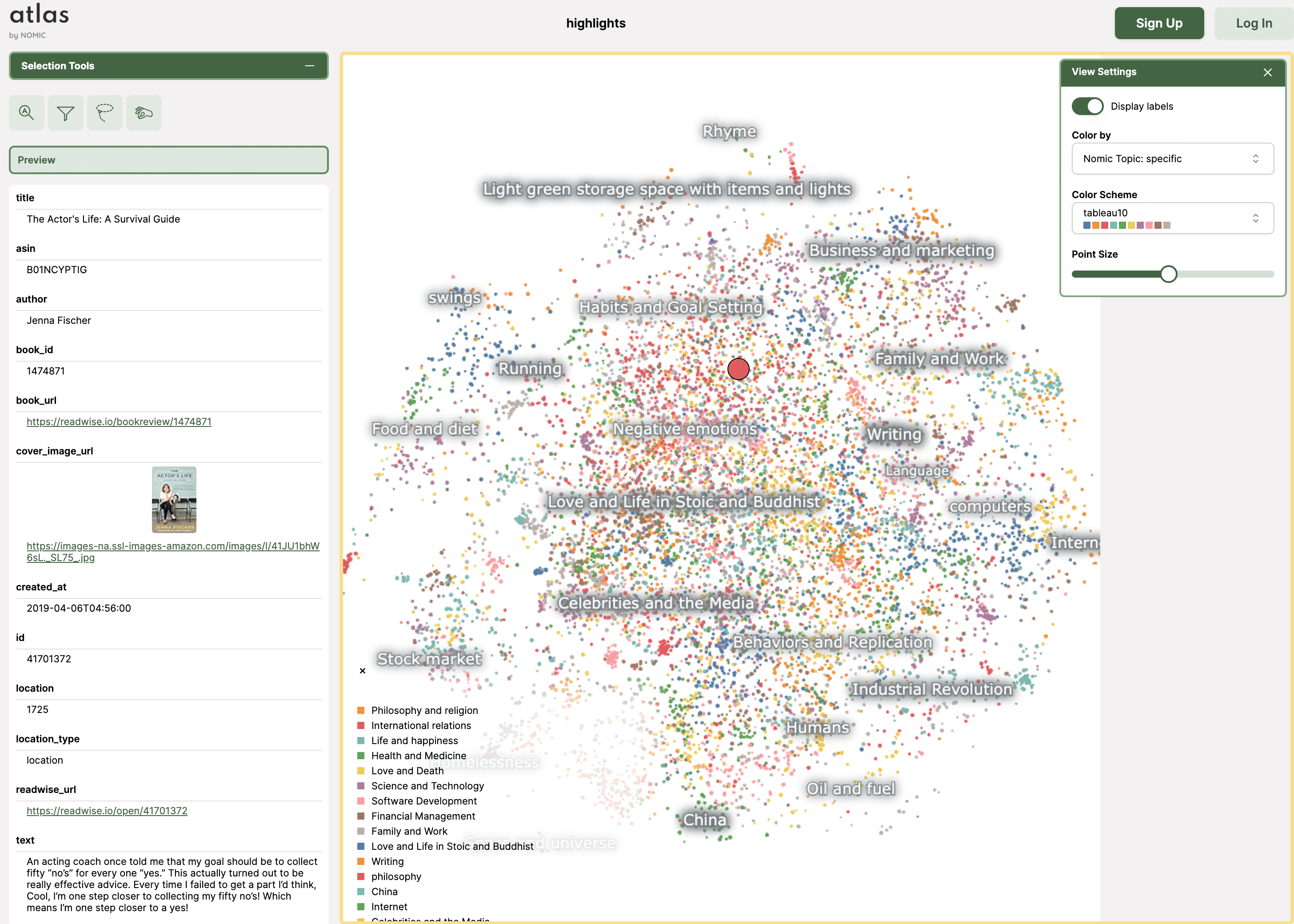
Joining the upper class of readership means investing in the process of erudition, a devotion to taking on the challenge of propositional learning, and becoming...well read!
Next week, in the final part of this series we will discuss some of the more subtle parts of becoming a well-read person, including dispelling some misconceptions of what it means to be able to call ourselves "well-read". Stick around!
Ye Olde Newsstand - Weekly Updates
 Bram AdamsBram Adams
Bram AdamsBram Adams
Media dump for the week of Issue 45 + some pictures from my birthday party!
 Bram AdamsBram Adams
Bram AdamsBram Adams
The site has a brand new look, go check it out!
Thanks for reading, and see you next Sunday!
ars longa, vita brevis,
Bram
P.S. If you are reading this the day this issue hits your inbox, today (January 28th) is my birthday 🎂! Here is a collection of pictures of myself over the decades if you're curious.
Issue 44: Is Being Well Read Actually a Thing? Part I - Zero to One
The superpower we neglect to use
- Part One: Zero to One (you are here)
- Part Two: The Upper Class of Readers
- Part Three: The Well-Read Archetypes
Dear Reader,
Food For Thought
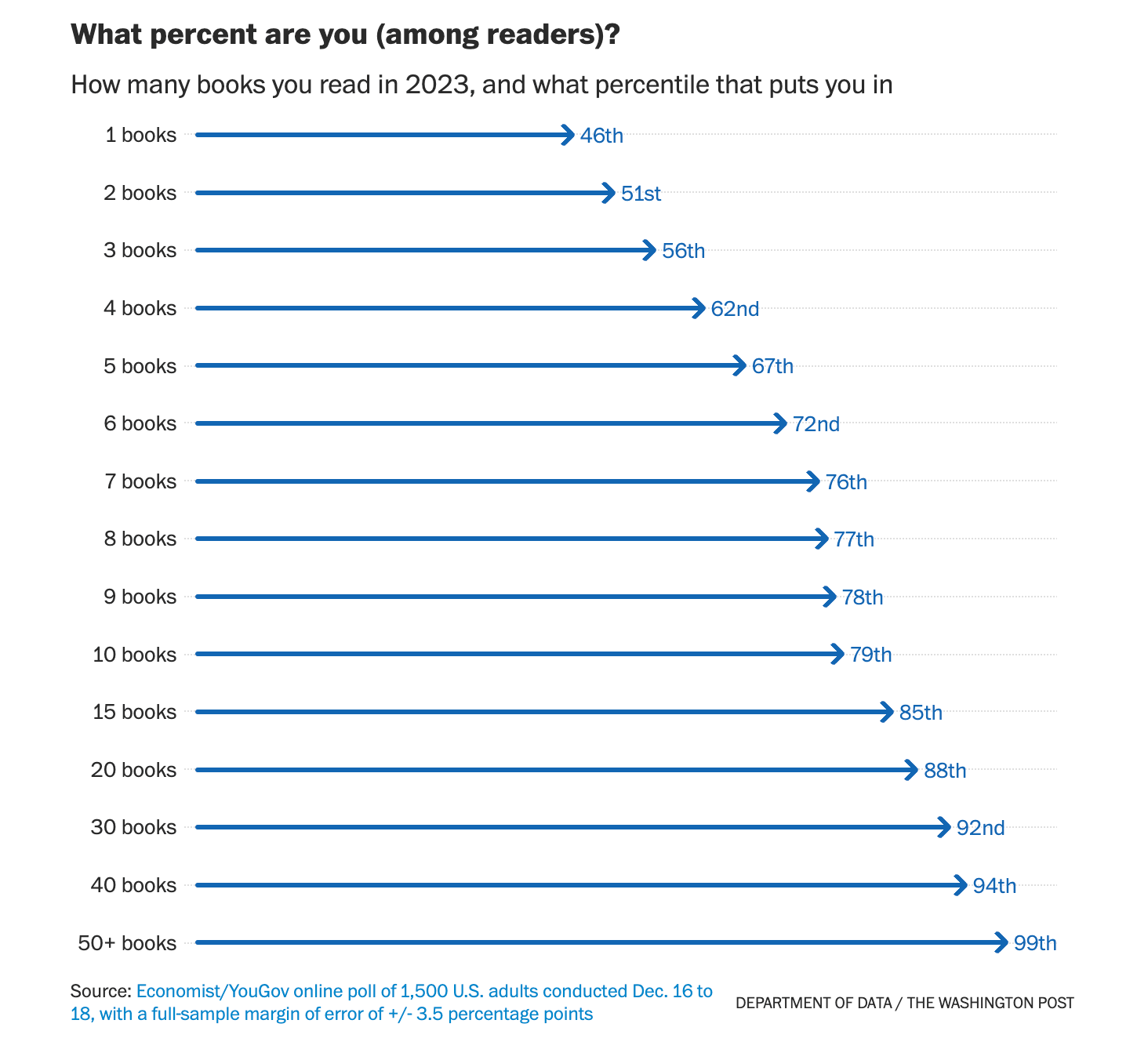
A few weeks ago, Andrew Van Dam of the Washington Post released a piece on how much Americans read in 2023. There are a few intriguing, disturbing, and hopeful ramifications & conclusions we can draw from this dataset.
First and foremost, from this survey we can see that simply reading two books in a single calendar year puts you in the top half of the population. This is...pretty sad, honestly.
Of these two books, we can safely assume that of the majority are the "popular/coffee table" books of the year, the bestseller/airport/Oprah-recommended books, since these books are brought up the most in conversation (or are at risk of being brought up at least). This means that a significant portion of the American population only barely reads of their own volition, and when they do read, it is to not be left out of the peer pressure conversation where everyone is talking about "Tomorrow, Tomorrow, Tomorrow" or "Little Fires Everywhere" or "Sapiens" or "Greenlights", etc.
When a reading habit becomes subservient to a "need to fit in" habit, we are not setting up America's population for the type of deep, consistent thinking the country needs as the world continues to grow in complexity; we are creating a country where being seen as a part of the conversation is the goal. To be visible to our peers is more important than the value books alone provide.
But perhaps this isn't a big deal, right? People are busy after all, and why should reading books take up our precious time?
Well...
Let's compare these findings with just one popular social media app of the many out there today: TikTok.
TikTok says it has 150 million U.S. users; Sensor Tower, a market intelligence company, says users spend an average of 93 minutes a day on the app.
(source, NYT)
Comparing apples to apples here, 150 million US users ~= 1/2 of the total U.S. population. That means that half of the population are consuming almost two hours awake on just one app, not to mention crossover to the other escapism/time-waster platforms like Instagram/Reddit/YouTube/etc. The same exact ninety minutes spent reading could accomplish 1/4 of a standard book PER DAY (avg book length = 85k words, avg adult wpm = 250 words, 250 wpm * 90 minutes = 22.5k, 22.5k/85k = ~26%). Just from replacing existing TikTok habits!!!
I get it. TikTok is fun, it's really fun, and all you have to do is swipe and consume high-pace, exciting content from interesting people from across the planet. But let's not confuse what short form internet based consumption is, and assume that it is merely a new form of information capture comparable to books. TikTok and ilk are not, not, not active engagement for the mind. They are passive. Only active reading (and deep one-on-one conversation) can create the breadth and depth of a fully fleshed out topic from both another human being to ourselves – at the speed the human mind needs to do its most critical task – reasoning; to process information slowly.
Some people are deeply attracted to this highly accelerated pace of life—going far out of their way to bring it about and feeling anxious, tense or uncomfortable when the pace slows. They want desperately to be "where the action is." (Indeed, some hardly care what the action is, so long as it occurs at a suitably rapid clip.)
-- Future Shock (affiliate link)
Now, social media, especially in the modern world is a pretty low hanging fruit in terms of critique. Social media may in fact be a symptom of what the lowly book simply cannot provide. I am of the opinion that social media usage is actually downstream of freneticism, loneliness, lack of a community, and most importantly, a deep fear of boredom. Studies have shown we moderns would prefer actual physical pain than even risk being bored. The pain of being well read, of picking up a book and just sitting there for an hour-plus is where we must start if we want to repair our commitment to erudition, which is a skill that is more valuable today than ever before due to the rise of information markets.
Our first goal should be to level up the median American to at least 12 books a year – a single book per calendar month – to keep the mind sharp, engaged, and in deep study of any particular topic of curiosity at a time. This will move the readership literally from zero to one (book read per month).
Here's a strategy that worked for me when I first started a reading habit that you, or someone who is new or averse to reading might try – taking inspiration the Secretary Problem from my Computer Science days at university. All the books referenced in this issue were consumed with a similar strategy.
- The first of the month, choose 3-4 books that appeal to you.
- Read ~20-30 pages into each book.
- Cut the worst book from the pack.
- Repeat steps 2 & 3 the second week (read another 20-30 pages), for the remaining 2-3 books.
- Finish the book(s) that are better than the best book you cut the filters for weeks three and four (1-2 books).
The advantages of this strategy include:
- Your reading practice at the start of each month is more exciting as you get to sample multiple books, and we minimize the risk of getting "married" to a bad book.
- You try a breadth of topics, quickly finding your preferred genre over time, and what genres you might prefer to avoid.
- You get in the habit of being mentally "ok" with not finishing books.
- You work on your daily reading habit.
- You start finishing books, which is the ultimate goal!
Reading is a real life super power, let's take advantage of it.
Next issue, we will return to this Washington Post dataset and take a look at the emergent "class dynamics" of readers on the "lower", "middle", and "upper classes", and what this separation means for those who take their lifelong education seriously.
On My Nightstand - What I'm Reading
Here are four quotes from different books about the importance of reading, and the unique aspects that only reading does to the human mind.
Reading remains an unsurpassed vehicle for the transmission of interesting new ideas and perspectives.
-- Where Good Ideas Come From (affiliate link)
Few inventions ever did more to prepare the brain and poise the species for its own advancement. As literacy became widespread in a culture, the act of reading silently invited each reader to go beyond the text; in so doing, it further propelled the intellectual development of the individual reader and the culture. This is the biologically given, intellectually learned generativity of reading that is the immeasurable yield of the brain’s gift of time.
-- Proust and the Squid: The Story and Science of the Reading Brain (affiliate link)
Given the paucity of trustworthy sources, much of Napoleon’s early childhood must remain conjectural, but there is little doubt that he was a precocious and prodigious reader, drawn at an early age to history and biography. Letizia told a government minister that her son ‘had never partaken of the amusements of children his own age, that he carefully avoided them, that he found himself a little room on the third floor of the house in which he stayed by himself and didn’t come down very often, even to eat with his family. Up there, he read constantly, especially history books.’ Napoleon claimed that he first read Jean-Jacques Rousseau’s La Nouvelle Héloïse, an 800-page novel of love and redemption, at the age of nine, and said ‘It turned my head.’ ‘I do not doubt the very powerful action of his early readings on the inclination and character of his youth,’ his brother Joseph later recalled. He described how, at their primary school, when the students were instructed to sit under either the Roman or the Carthaginian flag, Napoleon insisted that they swap places and utterly refused to join the losing Carthaginians. (Though he was eighteen months younger than Joseph, Napoleon was always stronger-willed.)
-- Napoleon: A Life (affiliate link)
Writing really is a transcoding of thought, a translation from the two-dimensional surface of images into a one-dimensional linear code: out of compact, blurred pictorial codes into clear, distinct written codes; out of the imaginary into the conceptual; out of scenes into processes; out of contexts into texts. Writing is a method of tearing imaginary things apart and making them clear.
-- Does Writing Have a Future? (Electronic Mediations Book 33) (affiliate link)
Ye Olde Newsstand - Weekly Updates
 Bram AdamsBram Adams
Bram AdamsBram Adams
I put up all the repos for obsidian I've built over the years!
 Bram AdamsBram Adams
Bram AdamsBram Adams
This weeks' Friday picture + video + music dump!
Thanks for reading, and see you next Sunday!
ars longa, vita brevis,
Bram
Reflections on 2023 & Predictions for 2024 [Video Version]
Video version of issue #41
video for issue 41
Issue 43: Are Our Goals Holding Us Prisoner?
Does free will exist within a goal?
Food For Thought
An interesting quandary to entertain – do we "live" inside our goals or do our goals "live" inside us?
On the face of it, such a question seems silly. Of course our goals are subservient to us, right? To run that marathon, to become more present for our family, to free ourselves from our uglier habits, to become the best version of ourselves we can mange. These are all goals that take place in some indeterminate future, where we can envision ourselves having accomplish(ed) the goal G in that future person F's past. The actor only exists in the present moment, the now; the motivator has his or her motivations and takes action to meet that ideal person. We chose our goals, right? But what if it's actually the other way around? What if our goals choose us?
Let's look at this another way. The present moment, now, is t = 0. Your lifespan from t = 0 goes in two directions, left until the start of your timeline (t = birth) and right until the end of your timeline (t = death). In other words, t = 0 is a snapshot on a roll of film, a derivative on a bounded line of existence.
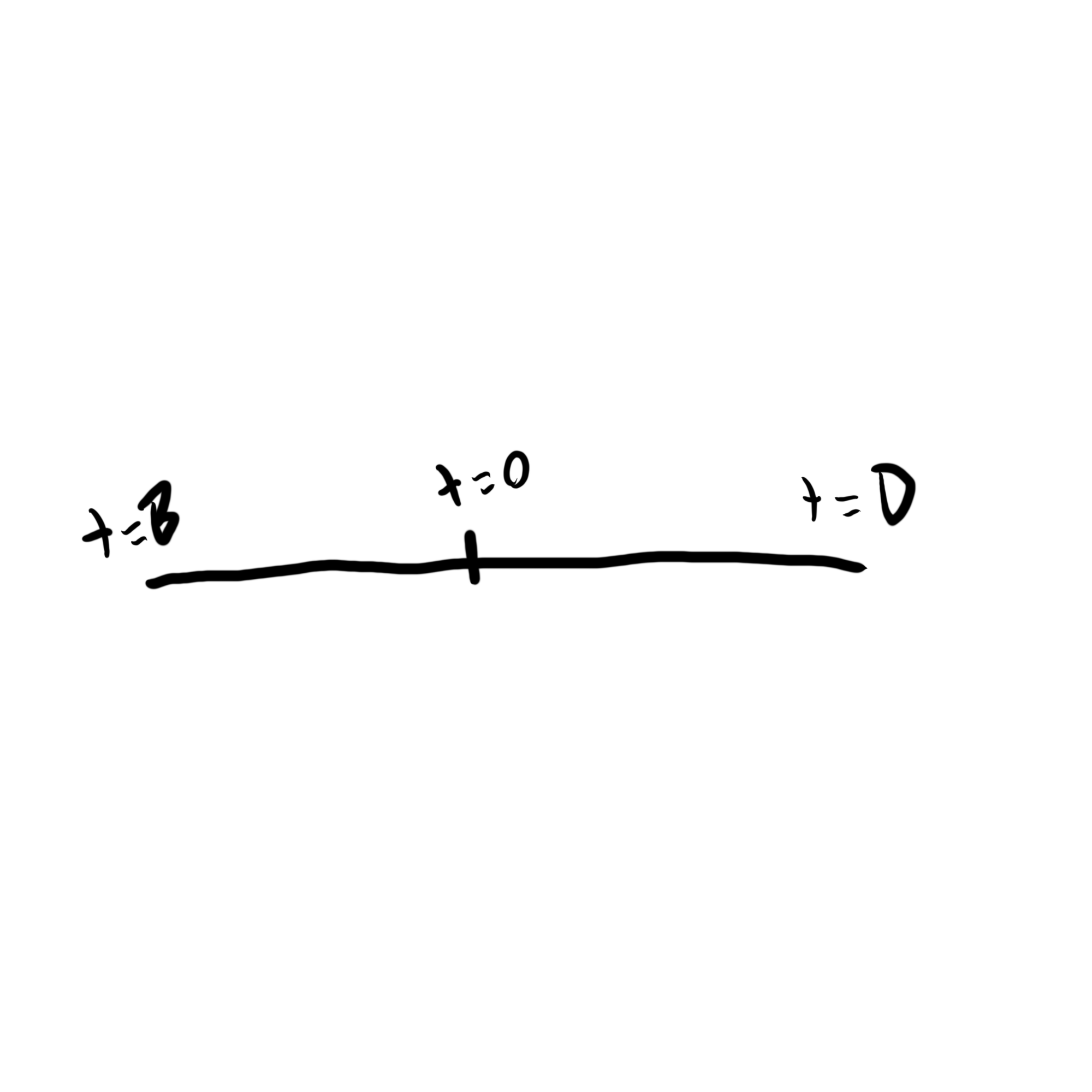
In addition to the existence of this finite line, we have to contend with the fact that the future is not just one line, in reality it is many, many lines, all with a certain probability of coming true (most are close to zero, others, close to guaranteed).
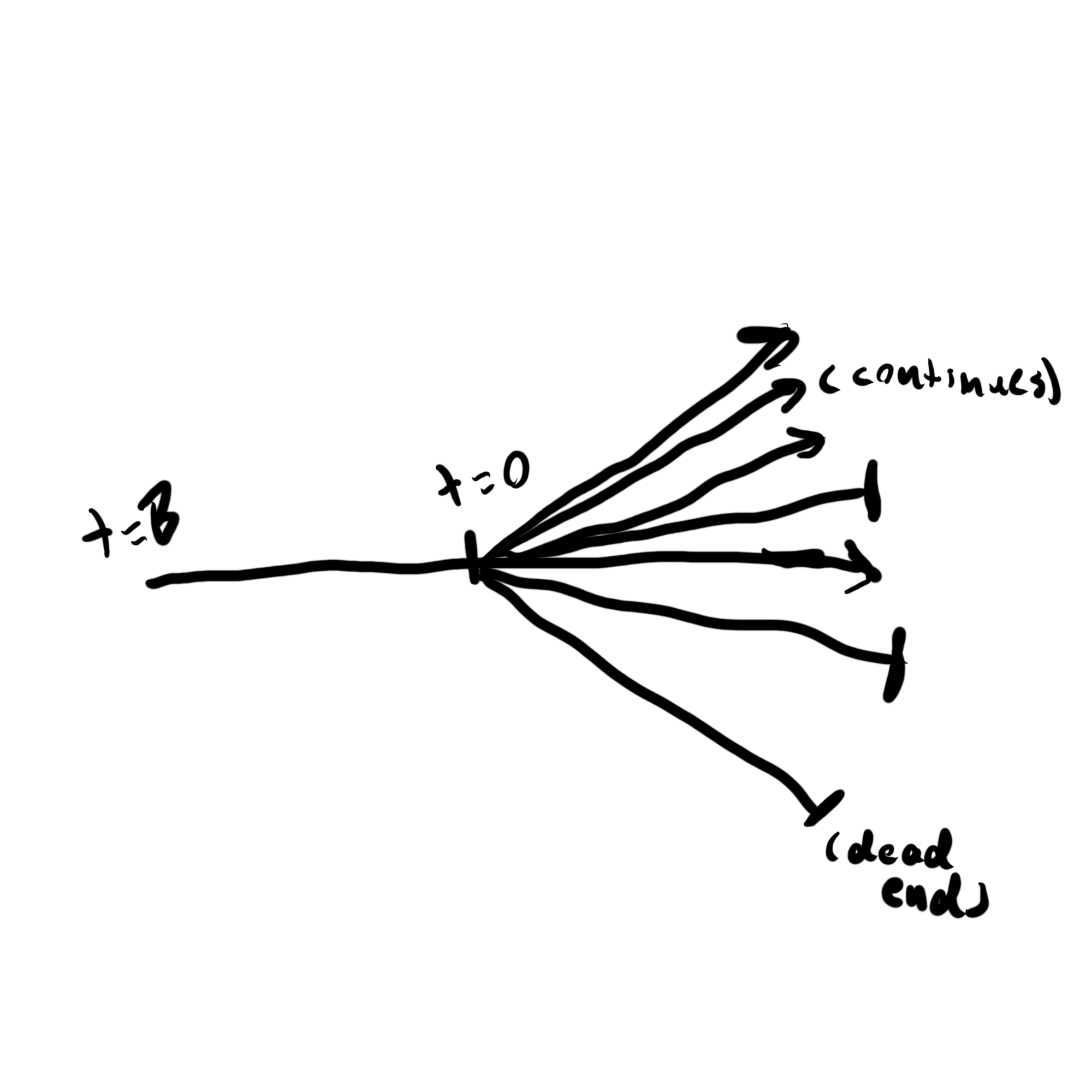
The past is a locked in version of these futures, making the present basically a fancy singularity device – all futures get replaced with a single realized outcome.
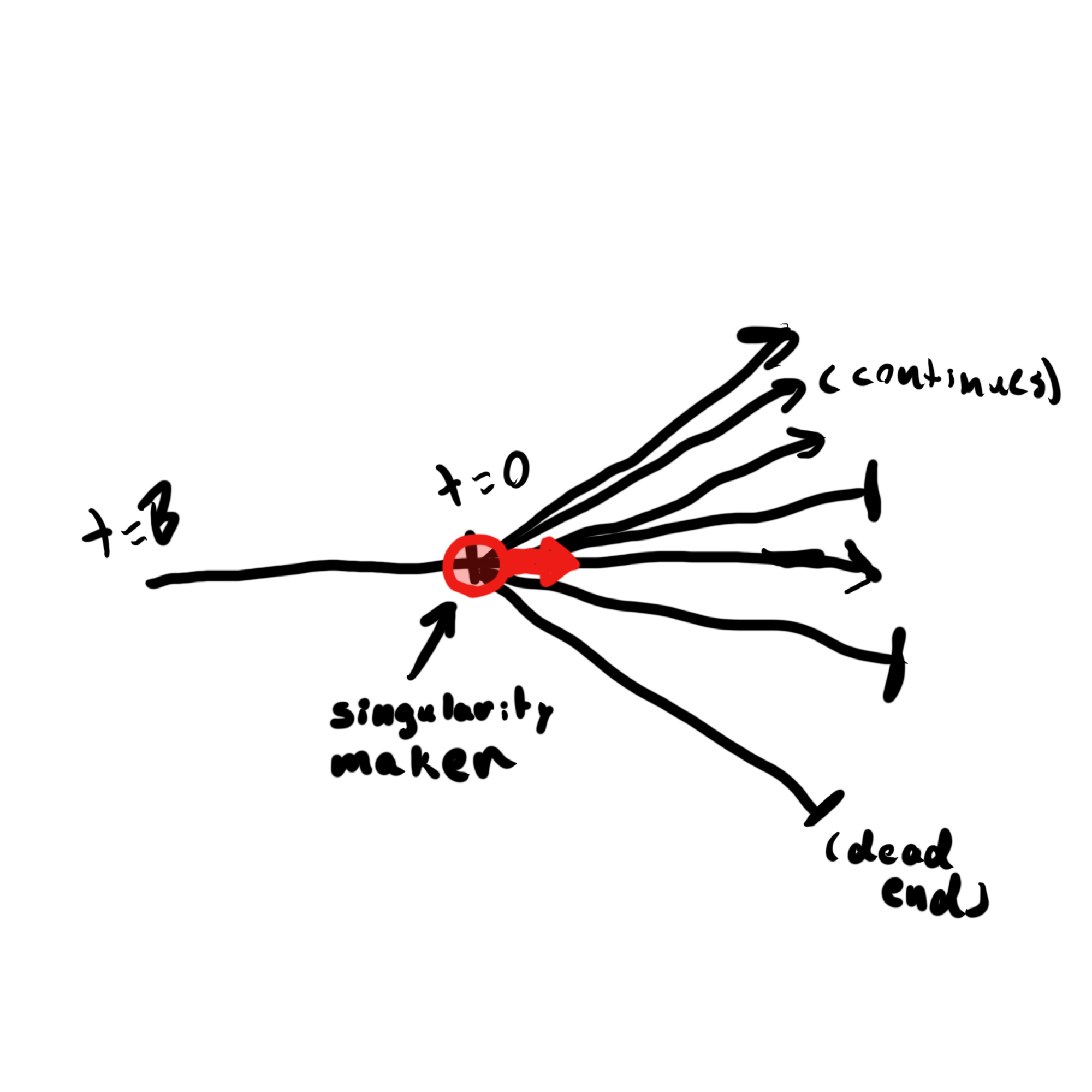
Now let's create an arbitrary goal, G, for the person at t = 0 to set out to accomplish – say, make $10,000. The internal or external speaking/manifestation of this goal causes the mind to immediately leap to action, trying to find ways that it could accomplish G. Some ways might include:
- Go back to college to skill up in a marketable degree for two years (-$100k in student loans + two years of life) to apply for a job that pays $10k a month (~six figure salary). G = accomplished
- Steal $10,000 from your local bank branch (-25 years of life in jail + probably a face tattoo in prison). G = accomplished
- Pick up a second job, work an extra 40 hours a week for the next period of time (-40hours/week * number of weeks * loss in sleep). G = accomplished
- Wait until your rich great-great-grandmother passes away and argue with your cousins over her estate (-being born into such a family + breaking up that family succession style). G = accomplished
- ...
Any number of arbitrary n+1 futures can be created to accomplish the same goal. I.E. there are multiple ways to skin a G. However, all of these realities incur their own unique cost structure of time and space requirements. Some are objectively better than others, others yet are subjectively better than others, and some are simply dead ends.
But this is only the case if we're looking forward from t = 0, the present perspective. This is not the case when we rewind the tape of each of these futures back to t = 0. The weights of the lines, as far as we can tell out of the haze, are actually pre calculated. In other words, the futures themselves decide the options that the person at t = 0 sees. The lines play themselves out and then act in reverse. We choose from the list of available options that chose us.
The multiple lines of futures collapse on the present.
What does this mean? At any point t in your life that is not the exact moment of now, your mind and your goals have conspired together to show you a vision of a person who is likely to fall on the timeline where G is accomplished with minimal overhead cost. The only role of t = 0 is to play the film it was given into the camera and memorialize it into the past.
Some day, very close to now, perhaps you'll look in the mirror somewhere between t = 0 and t = G and realize that you are or you aren't making good progress towards the goal you set. Perhaps you'll be displeased, and you may find yourself back at the bargaining table, attempting to convince your mind to try to hop to an alternate future. Or so it will feel. That line itself, will in fact be making you think that you chose when in fact, it has gone out into the same future we envisioned and already made the case to move lines and switch strategies. Trippy, right?
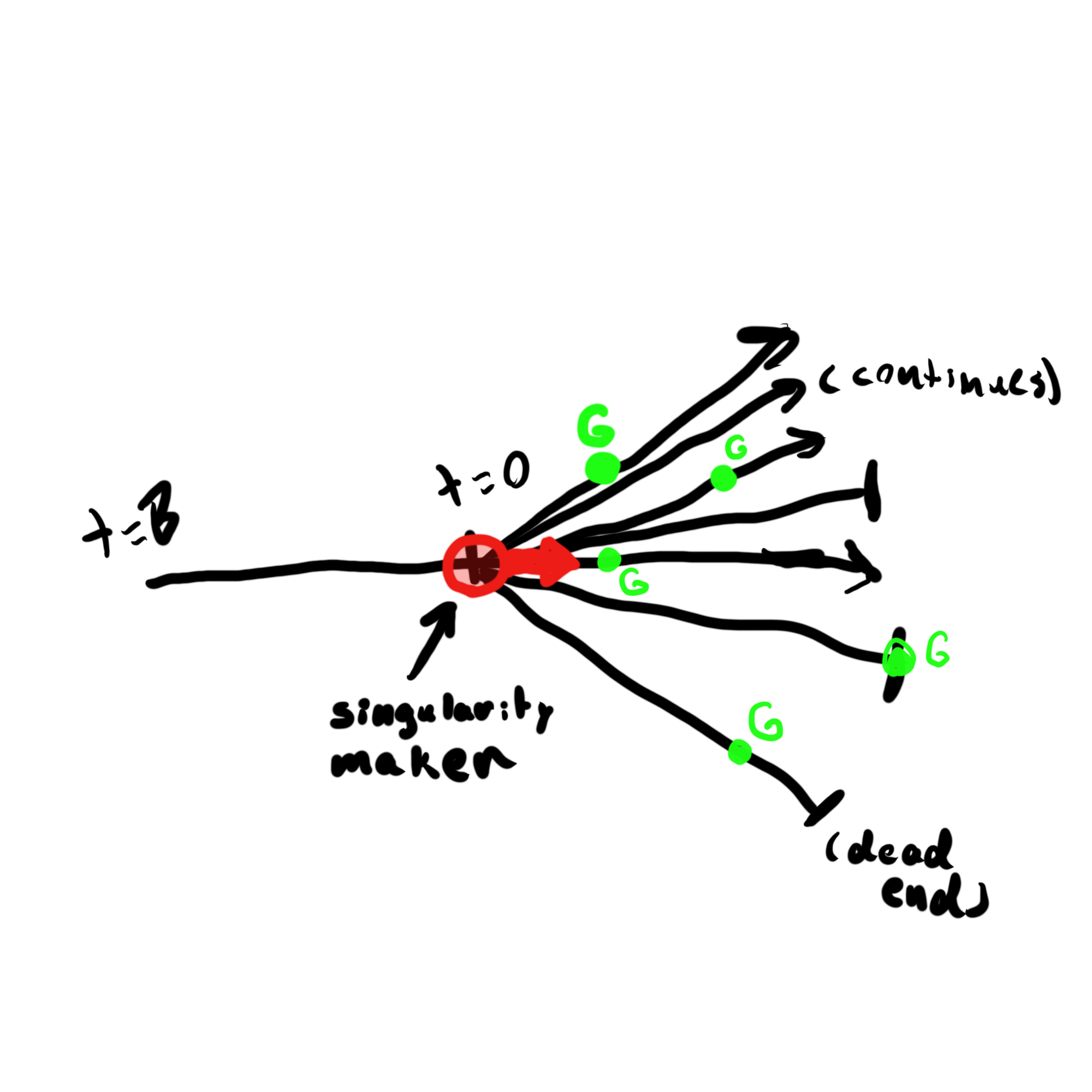
Maybe that line you move to will work, or maybe it won't. But when you look at the frozen state of the past behind you, that is the life you lived. That is who you were. That is who you are.
Even the choice of doing nothing, of letting the world filter through you is merely letting the line of time that is most probable become well... actualized. Intent and agency is the pivot, but the lines play out as-is.
Potentiality, history, pivots. Future, past, present.
Ye Olde Newsstand - Weekly Updates
I filmed a few video versions of some prior newsletter issues, if you prefer that medium. I'm working out the kinks, but hopefully I'll be able to add these videos to the weekly retinue of content pushed out each week! Likely, the video of a newsletter will lag 1+ week(s) behind the text edition.
 Bram AdamsBram Adams
Bram AdamsBram Adams
First up -- Are GPTs Websites? (Adapted from Issue 42)
Thanks for reading, and see you next Sunday!
ars longa, vita brevis,
Bram
Issue 42: Are GPTs Websites?
Or are they perhaps something else altogether?
Dear reader,
Food For Thought
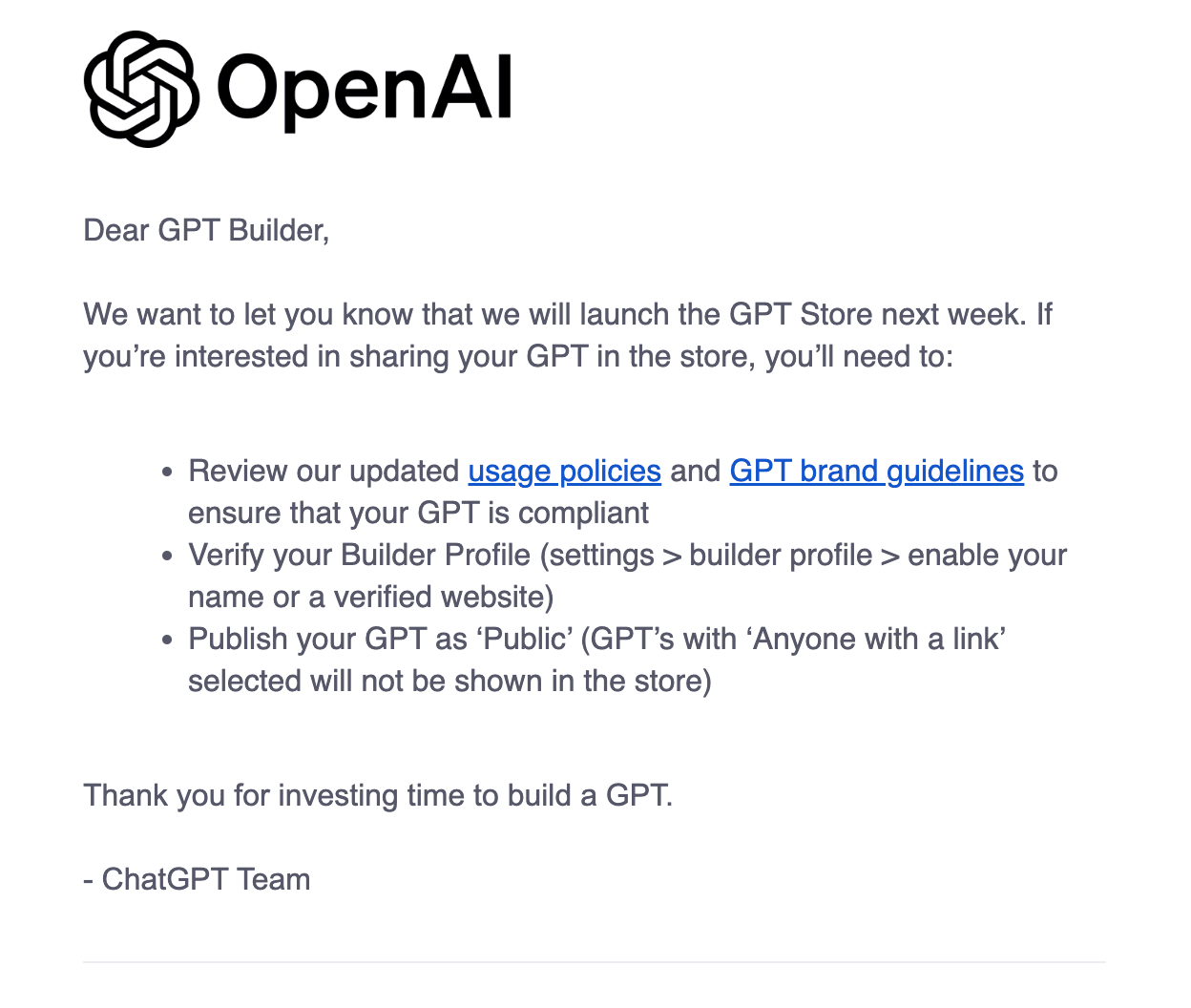
The GPT Store cometh! The week this issue (42) is published, OpenAI will offer its own official version of an "App Store" for GPTs. This store will feature community use cases of GPTs, create a new kind of market with new rules for money, deluge us with many poorly thought out GPTs, and legitimize truly novel experiences yet to be uncovered. All at the same time!
In part II of the holiday issue, I made this prediction:
GPT agents begin to pop up in places QR menus and PoS iPads exist, people get used to talking to agents in a variety of scenarios (high confidence)
I'd like to use this issue to substantiate that prediction.
Let's open with a question with a non obvious answer. What is a website?

In the most brutal definition, websites are readonly pages of information. Due to the technical realities of the ARPANet era, moving large packets of data (think HD video or MMO games) reliably from computers physically located in different geographical locations was not a trivial problem. As such, static text-only webpages were the first websites. Much like a printed piece of paper, webpages were distributed on demand by visiting a unique address, known as a URL.
But right out the gate, websites were special. Inside web pages themselves, creators were able to link to other pages. This meant that information could spread as nodes in a graph, that could create interesting non linear paths. A piece of paper physically located in Boise could point to another piece of paper in Baton Rouge, which in turn points to a piece of paper in Singapore.
This linking feature was very important, because there was (and is, to this day) no way to randomly stumble upon websites continuously (this is why search engines perpetually index the web for new data). In other words, jumping from computer address to computer address is a discrete jump, where in the physical world, travel is contiguous. This is important, because this means that the Internet itself is sparse, and has a tendency to amalgamate.
As a medium, the internet is defined by a built-in performance incentive. In real life, you can walk around living life and be visible to other people. But you can’t just walk around and be visible on the internet—for anyone to see you, you have to act.
-- Trick Mirror: Reflections on Self-Delusion (affiliate link)
Because of this fact, information on websites became silos by default. Each "acre of land" was only farmed upon by its creators. Nearly 30 years after the CERN website launch, this is still the case. It takes place on much larger silos – those of YouTube, Reddit, and Twitch streams, but the concept is still the same: information at an address that can be linked elsewhere. In this 30 year period, the world itself has become Internet native, spawning brand new economies, and creating write access to pages that have created emergent properties like influencers. The silos of a TikToker or a LinkedIn influencer is write access to a largely readonly Intranet. Your @ is not your friendships, it is a link on two sub-pages within a social network domain (@alice follows (points to) @bob, @bob follows (points to) @cheryl and @alice).
What about GPTs?
GPTs are also information. Specifically, GPTs and agents are a thin layer of information on a deep layer of contextual knowledge. I.e GPTs are subject matter experts for foundational knowledge stacks. The graph of data is still there, it is merely implicit, rather than the explicit discrete jumps of the world wide web. The subject matter is within the foundational knowledge graph. Your role as a GPT creator is to introduce a few new concepts inside a context window, things the model doesn't know, and the model will create implicit links to the rest of itself.

GPTs do differ from websites in one immediate facet. GPTs are fundamentally conversational. Instead of readonly, the user is compelled to engage with the bot, to interact and in fact, assistants will do nothing unless prompted.

There are at minimum two types of GPTs that will begin to crop up:
- Smart Forms - Forms today cannot be inquired against, they only demand in silence. Why do you need my middle name, Mr. Form? What is an EIN? How long until I hear back on average? A GPT will be able to stop mid form to teach you these things and then continue to complete the form. Excitingly, these can be branching programmatic forms as well – if user says x, the GPT responds with y, etc.
- Local Information Load Balancer - Just like websites gained network value in the 2000's, so too will GPTs create local networks for local problems. Questions about local restaurant menus, conversational audio guides for museums fall under this category. These are the QR code thin assistant layer, the "do you have this brand of tissue?" "Yes, aisle 5" (here are two examples of load balancers I've made: an interactive conversation with a blog post I wrote, and a World of Warcraft Season of Discovery rune helper). With API actions these plugins will surely have a major impact on how people exchange and expect to receive up to date information.
In sum, I make the claim that a GPT is a subject matter expertise layer on top of a massive implicit graph of conversational data. In a sense, a website is this as well, each URL holding subject matter expertise on running marathons, or ducks, or whatever. With the architecture of the web, the sites were siloed from one another, taking manual work from a human to leap from concept to concept. As the Internet has evolved we are now in a world where explicit graphs live in information silos: YouTube recommendation feeds, mutual follows. GPTs take the implicit graphs and give it context, they place subject matter expertise of what you know into context of what you didn't say.
We're in the primordial era of something really, really cool.
Ye Olde Newsstand - Weekly Updates
 Bram AdamsBram Adams
Bram AdamsBram Adams
I've come to the realization that these "core dumps/instabrams" are really just the "fun newsletter" a.k.a. shitposting. Micro time capsules, snapshots of links that will largely disappear into the void of time
On My Nightstand - What I'm Reading
Today the Internet is often described as an information superhighway; its nineteenth-century precursor, the electric telegraph, was dubbed the ‘‘highway of thought.’’
TCP/IP on January 1, 1983—an event that many would call the actual birth of the Internet.
-- The Dream Machine (affiliate link)
the internet generally minimizes the need for physical action: you don’t have to do much of anything but sit behind a screen to live an acceptable, possibly valorized, twenty-first-century life.
-- Trick Mirror: Reflections on Self-Delusion (affiliate link)
Whatever you’re into, there’s a website for that. We all play “a fractional part in some quite trivial matter,” as Kierkegaard says. And this is soothing.
-- The World Beyond Your Head: On Becoming an Individual in an Age of Distraction (affiliate link)
Thanks for reading, and see you next Sunday!
ars longa, vita brevis,
Bram
P.S. If you like what you read on this newsletter, forward it to a friend! It really helps!